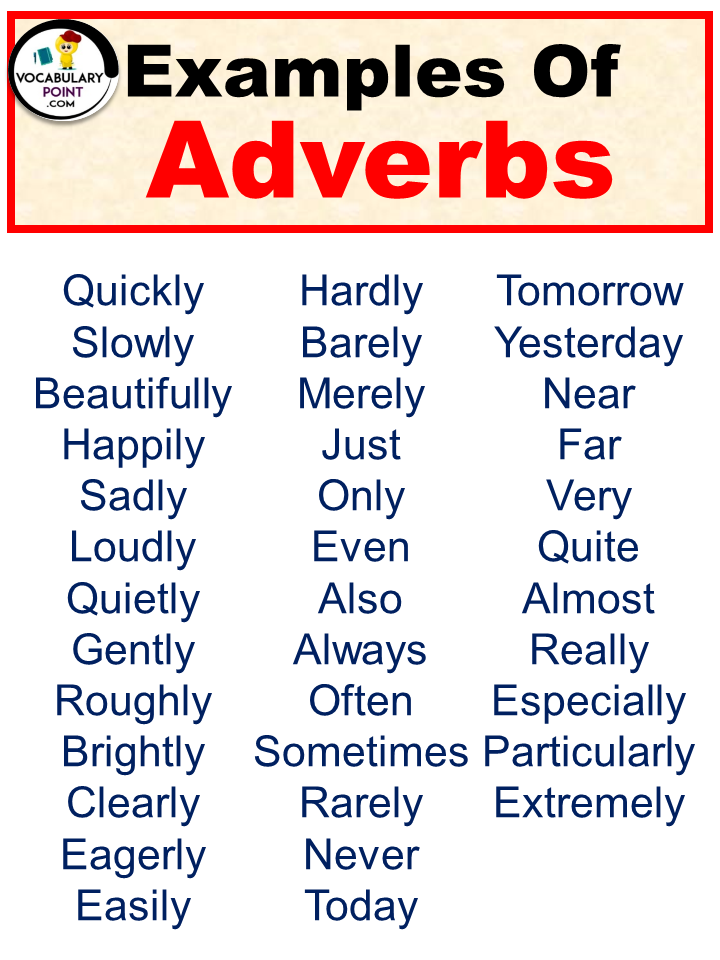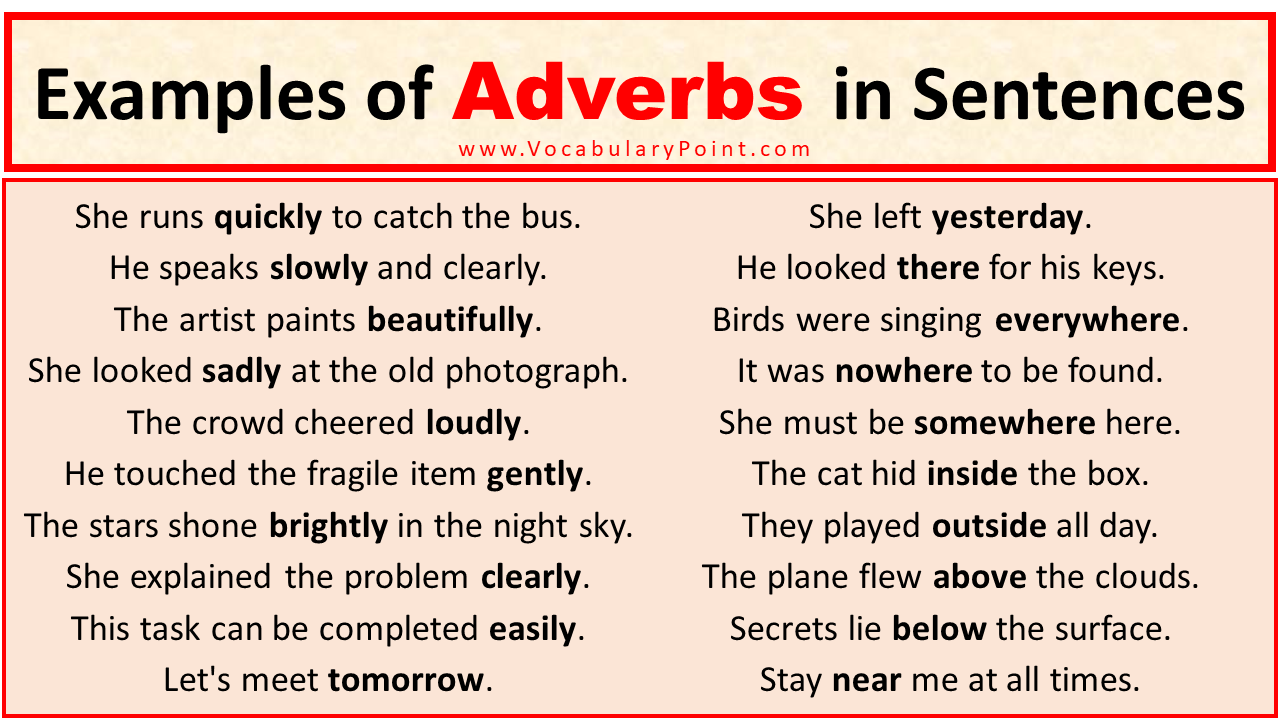Adverbs are versatile components of language that modify verbs, adjectives, other adverbs, or entire sentences. They add essential details like how, when, where, and to what extent actions occur, enriching the context and meaning of statements. Mastery of adverbs enhances both the precision and expressiveness of communication.
Adverbs are words that modify verbs, adjectives, or other adverbs, providing additional information about the manner, time, place, frequency, or degree of an action or condition. They often end in “-ly” but not always. Adverbs can change or qualify the meaning of a sentence by providing a clearer picture of the circumstances.
What Are The Examples of Adverbs?
- Quickly
- Slowly
- Beautifully
- Happily
- Sadly
- Loudly
- Quietly
- Gently
- Roughly
- Brightly
- Clearly
- Eagerly
- Easily
- Hardly
- Barely
- Merely
- Just
- Only
- Even
- Also
- Always
- Often
- Sometimes
- Rarely
- Never
- Today
- Tomorrow
- Yesterday
- Now
- Then
- Here
- There
- Everywhere
- Nowhere
- Somewhere
- Inside
- Outside
- Above
- Below
- Near
- Far
- Very
- Quite
- Almost
- Too
- So
- Really
- Especially
- Particularly
- Exceedingly
- Extremely
- Exceptionally
- Notably
- Significantly
- Surprisingly
- Remarkably
- Naturally
- Obviously
- Actually
- Certainly
- Definitely
- Clearly
- Likely
- Possibly
- Perhaps
- Maybe
- Frequently
- Generally
- Usually
- Regularly
- Occasionally
- Seldom
- Infrequently
- Annually
- Monthly
- Weekly
- Daily
- Hourly
- Suddenly
- Gradually
- Ultimately
- Initially
- Formerly
- Currently
- Eventually
- Previously
- Recently
- Shortly
- Instantly
- Briefly
- Temporarily
- Permanently
- Constantly
- Continuously
- Progressively
- Sequentially
- Simultaneously
- Concurrently
- Accordingly
- Consequently
Explore More:
Examples of (Noun, Pronouns, Adverbs, Adjectives, Verbs, Interjections)

Examples of Adverbs In Sentences
- She runs quickly to catch the bus.
- He speaks slowly and clearly.
- The artist paints beautifully.
- They celebrated happily after the victory.
- She looked sadly at the old photograph.
- The crowd cheered loudly.
- The library is quietly filled with students.
- He touched the fragile item gently.
- The wind blew roughly through the trees.
- The stars shone brightly in the night sky.
- She explained the problem clearly.
- The children waited eagerly for the show.
- This task can be completed easily.
- She could hardly believe her luck.
- He had barely finished when the bell rang.
- It was merely a misunderstanding.
- I just missed the train.
- He was the only person in the room.
- She even impressed the tough critics.
- He also wants to come along.
- She works always with dedication.
- He often visits his grandparents.
- I sometimes go for a walk in the park.
- This event rarely happens here.
- He never forgets to call.
- I will see you today.
- Let’s meet tomorrow.
- She left yesterday.
- Do it now or never.
- I was there then.
- She is here now.
- He looked there for his keys.
- Birds were singing everywhere.
- It was nowhere to be found.
- She must be somewhere here.
- The cat hid inside the box.
- They played outside all day.
- The plane flew above the clouds.
- Secrets lie below the surface.
- Stay near me at all times.
- He moved far away from home.
- It was very interesting.
- She was quite amazed.
- It’s almost time to go.
- The bag was too heavy.
- It was so exciting!
- I really appreciate your help.
- This is especially important.
- It’s particularly cold today.
- She was exceedingly grateful.
- The weather is extremely hot.
- His talent is exceptionally rare.
- This is notably different from the rest.
- Her performance was significantly better.
- It was surprisingly easy.
- He is remarkably intelligent.
- The process occurs naturally.
- It’s obviously a mistake.
- They have actually met before.
- It’s certainly a possibility.
- This is definitely the right way.
- The answer was clearly incorrect.
- It is likely to rain today.
- It might possibly work.
- Perhaps we should try again.
- Maybe we’ll win next time.
- He frequently forgets his keys.
- She generally wakes up early.
- I usually have coffee in the morning.
- He exercises regularly.
- We meet occasionally for coffee.
- She seldom eats out.
- It infrequently snows here.
- The event occurs annually.
- Rent is paid monthly.
- Meetings are held weekly.
- I exercise daily.
- News updates hourly.
- The weather changed suddenly.
- She improved gradually over time.
- The decision was made ultimately by the manager.
- Initially, the plan seemed good.
- He was formerly a teacher.
- Prices are currently rising.
- Success came eventually.
- This was previously owned.
- She arrived recently.
- We’ll start shortly.
- The response was instantly given.
- The visit was briefly postponed.
- This arrangement is temporarily in place.
- The change is permanently effective.
- She works constantly under pressure.
- The system updates continuously.
- The situation is improving progressively.
- Events unfolded sequentially.
- Two events happened simultaneously.
- The projects run concurrently.
- He acted accordingly to the rules.
- The accident happened and consequently, traffic was delayed.
- The sun shone brightly.
- He whispered softly.
- She arrived unexpectedly.
- They applauded thunderously.
- She worked meticulously.
- He answered correctly.
- The dog barked ferociously.
- The door opened silently.
- She sang melodiously.
- The story ended tragically.
- They laughed wholeheartedly.
- He drove recklessly.
- She walked gracefully.
- The rain fell steadily.
- He looked suspiciously around.
- The flower bloomed vibrantly.
- The news spread rapidly.
- She painted artistically.
- The machine works efficiently.
- He spoke authoritatively.
- They acted spontaneously.
- The decision was made arbitrarily.
- The bird sang joyfully.
- The team played aggressively.
- The water flowed smoothly.
- The cat moved stealthily.
- The wind whistled eerily.
- He explained logically.
- She reacted emotionally.
- The stars twinkled magically.
